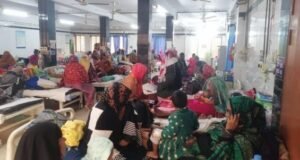
By vaccinating over 5 crore children in the past two decades, Bangladesh has prevented the deaths of approximately 94,000 children each year, according to the Shastho Shurokkha Foundation.
In addition, the under-five child mortality rate has dropped by an impressive 81.5%, placing Bangladesh alongside Nepal, Rwanda, Vietnam, Ethiopia, and Malawi as one of six countries to achieve such a significant reduction.
The findings were presented at a seminar titled “Success of the Immunisation Programme in Bangladesh: Existing Challenges and the Way Forward”, organised by Shastho Shurokkha Foundation at the National Press Club today.
The event featured prominent speakers including Professor Md Rafiqul Islam, director of Shastho Shurokkha Foundation; Dr Nizamuddin Ahmed, executive director; Farhana Rahman, Unicef representative; and Nasrin Sultana, executive director of RaDA.
Through vaccination in every region of the country, it has been possible to ensure primary healthcare. As a result, there has been significant improvement in maternal and child health, and both maternal and child mortality rates have decreased, organisers said at the seminar.
Highlighting the economic benefits of vaccination, organisers noted that every $1 invested in vaccines yields a return of $25.4, underscoring vaccines as one of the most cost-effective investments in health and development.
Bangladesh has made tremendous strides by successfully eradicating polio, eliminating maternal and neonatal tetanus (MNT), and bringing hepatitis under control. Furthermore, 93% of adolescent girls have received the HPV vaccine, a critical step towards preventing cervical cancer in women, they added.
Looking ahead, the government plans to launch a new typhoid conjugate vaccine (TCV) campaign starting 12 October 2025. Additionally, several new vaccines will be introduced to the Expanded Programme on Immunisation (EPI) by 2026.
The seminar was organised under a joint advocacy project between Shastho Shurokkha Foundation and Unicef Bangladesh, supported by the government’s EPI programme. It aimed to review the current status of vaccination efforts, identify ongoing challenges, and discuss necessary actions to improve immunisation coverage across districts.
Despite the successes, several challenges in implementing the EPI were raised at the seminar. Nearly 40% of the allocated positions for vaccination personnel remain vacant, with recruitment yet to be completed in 45 districts.
Moreover, 53% of cold chain technician posts at the district level are unfilled. Budget allocations have faced delays, and the 5th Health, Population and Nutrition Sector Programme (HPNSP) was recently cancelled. In its place, a new Development Project Proposal (DPP) has been drafted but is still awaiting approval.
 Weekly Bangla Mirror | Bangla Mirror, Bangladeshi news in UK, bangla mirror news
Weekly Bangla Mirror | Bangla Mirror, Bangladeshi news in UK, bangla mirror news







